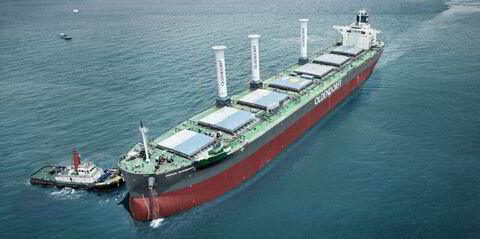Owners of smaller tankers will be the first to feel the effects of the upcoming unwinding of the tanker storage market, analysts said.
Jefferies' Randy Giveans, Christopher Robertson and Chadd Tribo see aframaxes being emptied first, as they are less cost-efficient than bigger asset classes.
"While it is true that floating storage is more expensive than onshore storage, this does not mean that destocking on tankers will occur before or faster than it does onshore due to logistical reasons,"said the analysts for the US investment bank.
They explained that crude stored on ships must be discharged and stored onshore before reaching an end market, and with onshore facilities essentially at peak storage, this means that room must be made there first.
Size matters
"We believe that as onshore storage is freed up, then destocking of offshore crude will take place first in the smaller asset classes, such as aframaxes, before working up into suezmaxes and VLCCs, as it is much more cost-inefficient to store oil on an aframax compared to a VLCC," Jefferies said.
Euronav has said around 8% of the global VLCC fleet is continuously engaged in floating storage at any given point as a necessary or permanent part of the crude logistics chain. This also includes the fleet of Iranian vessels that have exited the transport market due to US sanctions.
Jefferies estimates that between 50 and 75 VLCCs are currently operating in the floating storage market, in addition to between 50 to 100 suezmaxes.
The big oil market contango, where forward prices were higher than spot, has tightened substantially in recent weeks and there have been fewer new floating storage contracts, Jefferies said.
Fragmented approach
But US inventories are still building due to delayed loadings, and destocking will likely take place across different regions over different time periods, depending on the pace of economic recovery, the predicted.
"The over-supply of oil in the market will only be cleared when oil demand comes back," the analysts said. This could take time.
"We predict a step-down curve where steady periods of production decline are preceded by larger step-down periods as certain refineries or regions come back online faster than others," they added.
Volumes stored on vessels in Asia have already come down as demand in China returns. Jefferies said 24.8m barrels were discharged from floating storage at the end of May.
Any destocking could have both positive and negative impacts for shipowners.
A quick drawdown means more ships returning to spot market, pressuring rates, but it would also indicate good demand to support the sector.
The situation would be reversed in the case of a slower destocking.
Rates to rise in fourth quarter
Euronav said on its first quarter earnings calls that the last time the oil market was in contango it took about 12 months for ships that had been on floating storage contracts to return to the market.
Jefferies believes that, based on forward freight agreements from various brokers, rates will reach a seasonal bottom in the third quarter before increasing into the final three months ahead of the strong winter period.
Fearnley Securities has this week dismissed any possibility of a final rate spike for tankers this month, as onshore storage did not fill up enough to boost demand for storage again.
The Norwegian investment bank also said it sees any prospect of a rate rise in the short term as "gone for the summer."






